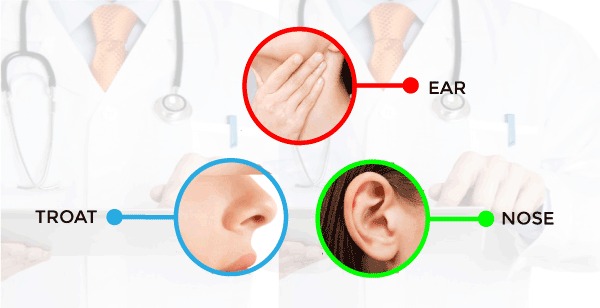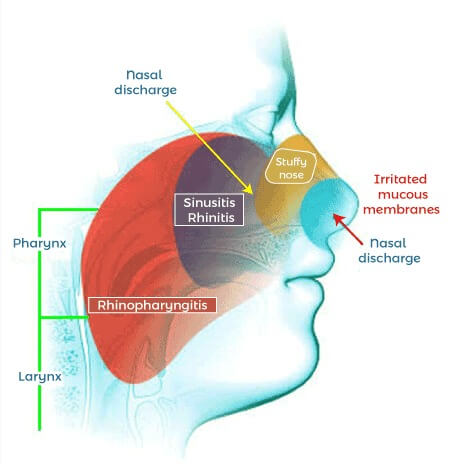What is ENT
ENT stands for Ear, Nose, and Throat. All the medical conditions which are related to these parts are called ENT. The doctor of ENT is commonly known as otorhinolaryngologists, otolaryngologists, ENT surgeons, or physicians. ENT includes the diseases that attack the daily activities of these organs such as eating, drinking, speaking, swallowing, hearing, and breathing. Other than this, they also include the surgical management and reconstruction of cancers, benign tumors, and plastic surgery of the head, neck, and face.

Etymology of Otorhinolaryngology
The word "Otorhinolaryngology" is derived from the combination of four Ancient Greek words: Otos (Ear), Rhis (Nose), Larynx (Larynx), Logia (Study).
What Does An Ent Do?
An ENT surgeon is responsible to treat all the issues which are related to the ear, nose, throat, base of skull, head, and neck. These issues can be related to the following problems:
- Hearing
- Ear Tubes
- Tonsils and Adenoids
- Sinuses
- Larynx
- Mouth
- Throat
- Ear Surgeries
- Thyroid
- Reconstructive and cosmetic surgery on the head and neck

Education and Training Required
To become an ENT specialist, first of all, the candidates have to complete an undergraduate course in any subjects related to biology or chemistry as these are helpful in further medical studies. The next step is going to a medical school to get admission in 4 years course. The course provides the classroom instructions in the first two years of studies while in the third and fourth year, the students do a rotation to get familiarized in various specialties to cover a wide range of experience and making a base in that field of treatment for which the candidates want to be specialized.
After completing graduation in the field of medicine, the ENT aspirants do a 5 years residency. The students complete the program under the guidance of experienced doctors and learn everything about otolaryngology. In the end, these students have to clear the state exam to become licensed doctors.
You can also opt for further specialization in the following fields after completing the training of 1 to 2 years:
- Neurology
- Sleep Medicine
- Pediatrics
- Allergies
- Cosmetic Surgery
- Balance Problems
- Swelling Issues
- Vocal Problems
- Sinus Issues
- Reconstructive Surgery
- Head and Neck Cancers
Sub-specialties of an ENT Doctor
Other than the problems related to the ear, nose, and throat, an otorhinolaryngologist covers the entire area of cervical, collar bone, and neck upward area. The ENT doctors have the sub-specialties in the following medical issues also:
- Head and neck oncologic surgery
- Facial plastic and reconstructive surgery
- Otology
- Neurology
- Rhinology/Anterior skull base surgery
- Laryngology and voice disorders
- Sleep medicine
- Pediatric otorhinolaryngology
When to See an ENT Specialist?
There are certain conditions or problems given below which may give birth to serious illness if not get treated on time. You are advised to see an ENT specialist in the following condition to avoid future risk:
- Long-term Throat, Ear, and Sinus Issues: Ear infection is a very common problem in children. In such a case you should go to an ENT specialist who may prescribe you some antibiotics as per the seriousness of the condition. If the infection does not get treated by the antibiotics then the doctor may recommend surgery.
A throat condition named tonsillitis which is an infection of the tonsils is also treated by these specialists with the help of antibiotics but if it persists then the doctor may prefer to remove the tonsils.
Another condition is sinus issues which are also treated by ENT specialists. If the sinus lasts for more than four months then it is called chronic sinusitis.
- Hearing Loss: A slow hearing loss is a normal problem but if the condition arises suddenly then it can be serious. The condition can be treated by consulting with otolaryngologists. They can easily find out the issue and make the required treatment to improve your hearing ability. It should be understood that an audiologist and an ENT specialist both are different. Audiologists are the medical professionals but not the doctor. They use various tools such as hearing aids or hearing protection devices to treat hearing problems. While an ENT specialist diagnoses the condition without preferring the use of such tools. After getting the treatment from an ENT doctor, you may take the appointment of an audiologist to fit your hearing aids completely.
- A Lump in Neck: If a lump in the neck lasts for more than 2 weeks then you should go for a check-up of mouth, throat, thyroid, or blood cancer. If cancer generates in these areas then its very extension can reach the lymph nodes located in the throat. The condition of the lump is not similar to the swollen lymph nodes. It is a serious illness that generally develops due to some other problems like an ear infection or strep throat.
- Heavy Snorer in Children: Snoring is a common condition in adults but in the case of children the condition is unusual. However, you should not so much worry about it, but it is advised to go to a pediatrician to consult whether the condition is serious or not, and in case if it is serious then you should go to an ENT specialist. If proper treatment is not given on time then snoring may give birth to sleep apnea which further may create complications with face bones or bedwetting in children.
|


 For Videos Join Our Youtube Channel: Join Now
For Videos Join Our Youtube Channel: Join Now










